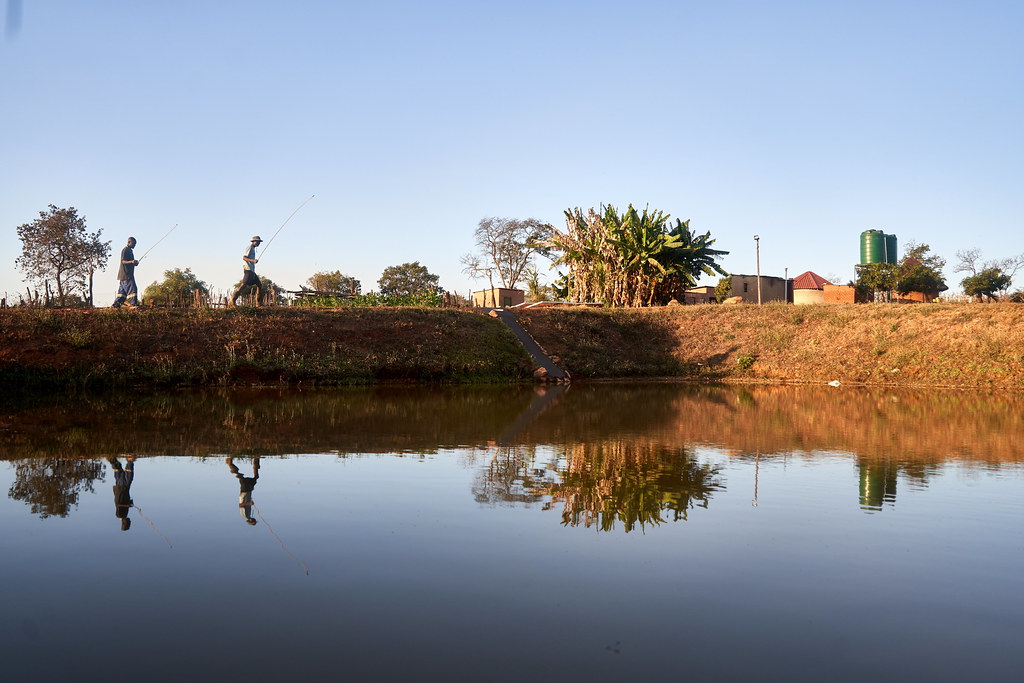Aquaculture practitioners at a fishpond close to their farmhouse
©FAO
Harare –
Thanks to the global aquatic value chain development program FISH4ACP, Zimbabwe has taken a major step forward by implementing the nation’s inaugural Fisheries and Aquaculture bill. This groundbreaking piece of legislation is set to transform the country’s fisheries and aquaculture industry.
The creation of the bill was managed by FISH4ACP, which is an OACPS initiative carried out by FAO with financial support from the EU and BMZ.
“The legislation offers an integrated and coherent legal structure that marks a significant shift for Zimbabwe’s fishing and fish farming industry. Led by FAO via their FISH4ACP initiative, the creation of this law involved substantial collaboration with multiple stakeholders nationwide,” stated Patrice Talla, FAO Subregional Coordinator for Southern Africa and Representative to Zimbabwe.
Significant efforts were directed towards involving women and young people to ensure broad inclusion. The comprehensive input gathered from nationwide discussions formed the basis of the initial draft prepared through detailed collaboration with the Attorney General’s office and specialists from the FAO.
In 2022, FISH4ACP carried out an assessment of the aquaculture value chains, highlighting that improvements in the policy and legal frameworks were essential catalysts for unlocking potential within Zimbabwe’s aquaculture industry.
“This legislation is transformative as it simplifies regulations, encourages sustainable methods, and boosts growth within the sector. I believe this will pave the way for expanding possibilities in economic advancement, ensuring food safety, and generating employment,” stated Milton Makumbe, who leads the Fisheries and Aquaculture Resources Department at the Ministry of Lands, Agriculture, Fisheries, Water and Rural Development.
The European Union takes pride in observing the significant advancements facilitated by our assistance via the FISH4ACP program within Zimbabwe’s aquaculture industry. This initiative has spurred notable developments such as stringent legislative frameworks and the establishment of breeding centers along with fingerling distribution hubs. Such achievements form the foundation for a comprehensive and eco-friendly fish supply network capable of generating substantial financial gains, fostering better employment opportunities—particularly among women and young people—and significantly enhancing nationwide food safety and economic stability,” stated Jobst von Kirchmann, the EU Ambassador to Zimbabwe.
“With this new Bill and a clear vision for 14,000 tonnes of farmed tilapia and USD 22 million in annual value by 2032, Zimbabwe is laying the foundations for a sustainable and inclusive blue economy,” added the Ambassador.
At a recent workshop, the draft was reviewed and validated by key stakeholders. It is now ready to be put before parliament and enacted into law.
This legislation has the potential to protect the future of Zimbabwe’s fish farming sector,” stated Loraine Motsi, who attended the workshop as a farmer. “By maintaining the purity of the supply chain—from fry to food—it allows farmers to cultivate top-notch fish and establish a prosperous aquaculture industry that enhances our whole country.
The bill is central to Zimbabwe’s aim of building a $1 billion fish industry by maximizing the use of its available water resources to combat hunger and malnutrition.
This will enhance the simplicity of conducting business within the fishing sector and encourage investments into the aquaculture supply chain. According to the FISH4ACP value chain study, this segment presently holds an additional value of $22 million.
The FAO has taken the lead in advancing aquaculture by offering technical assistance for setting up and restoring three breeding centers and two fingerling distribution hubs in Zimbabwe. These facilities are designed to encourage the adoption of superior genetic practices within the aquaculture industry.
FISH4ACP is a five-year program (2020-2025) initiated by the OACPS aimed at promoting sustainable fisheries and aquaculture development. This project focuses on boosting the productivity and competitiveness of twelve selected fishery and aquaculture supply chains within twelve participating OACPS nations. The aim is to ensure that advancements economically align with ecological responsibility and inclusive growth socially. Special emphasis will be placed on supporting small and medium enterprises due to their capacity to generate significant economic and social advantages, notably benefiting women and young people.
The Nile tilapia farming sector in Zimbabwe was among the 12 value chains chosen out of more than 70 global submissions to receive assistance from the FISH4ACP program due to its competitive edge.
Source:
Zimbabwe’s inaugural fisheries and aquaculture bill is in the works.
Provided by SyndiGate Media Inc.
Syndigate.info
).


Leave a Reply